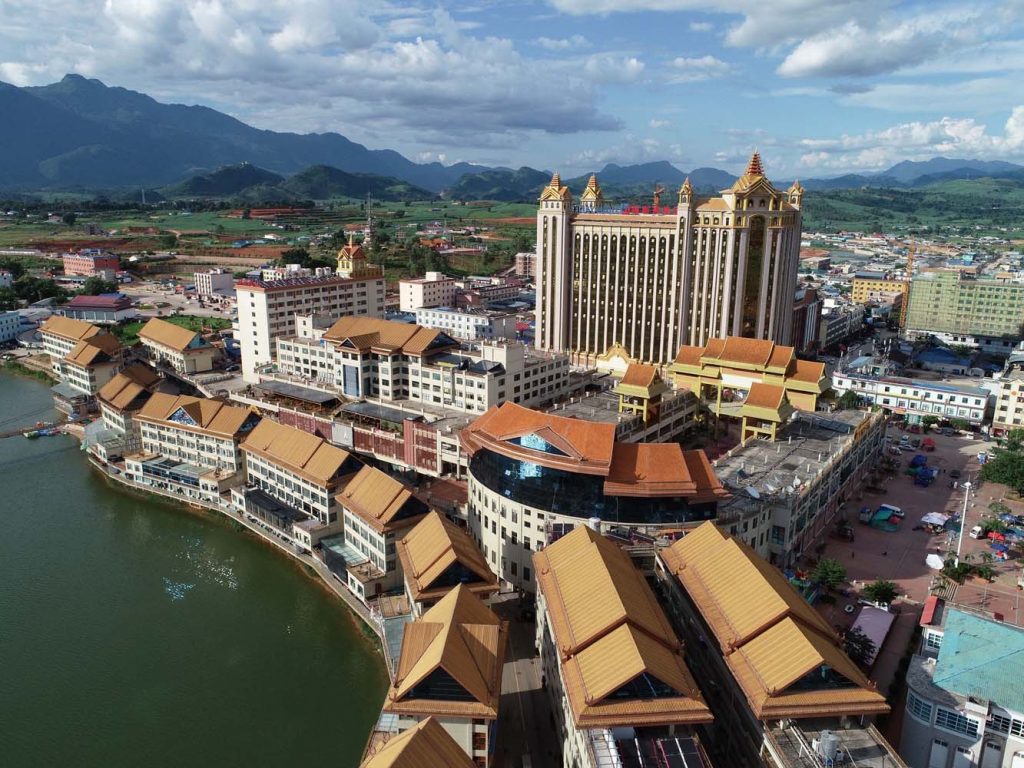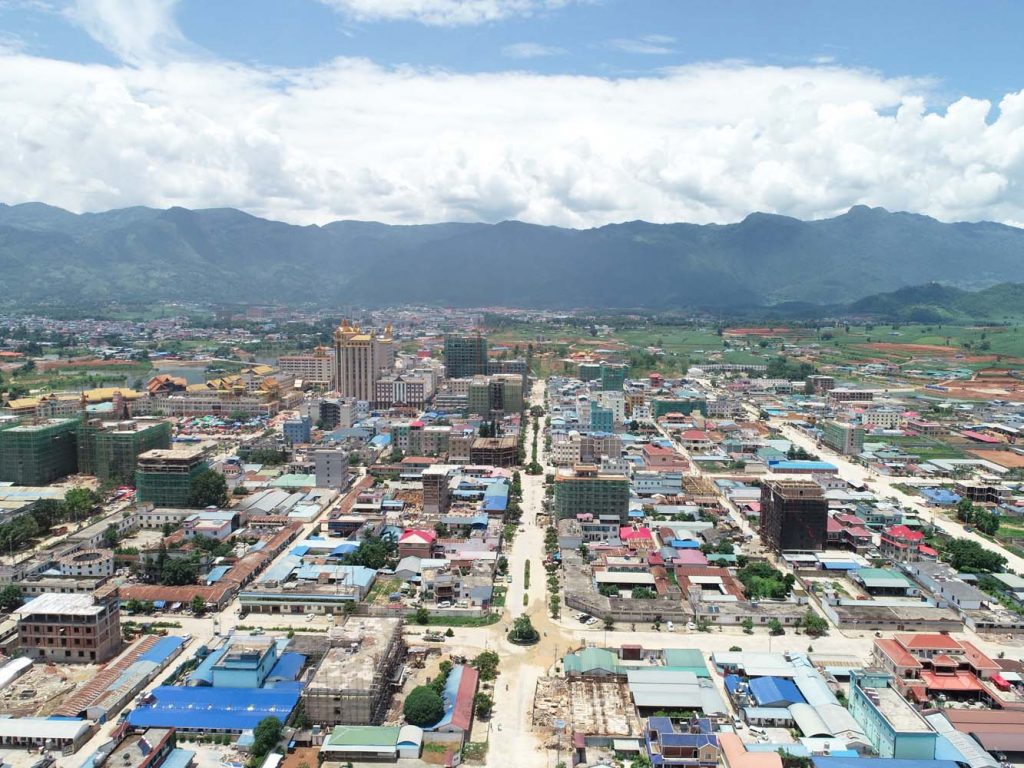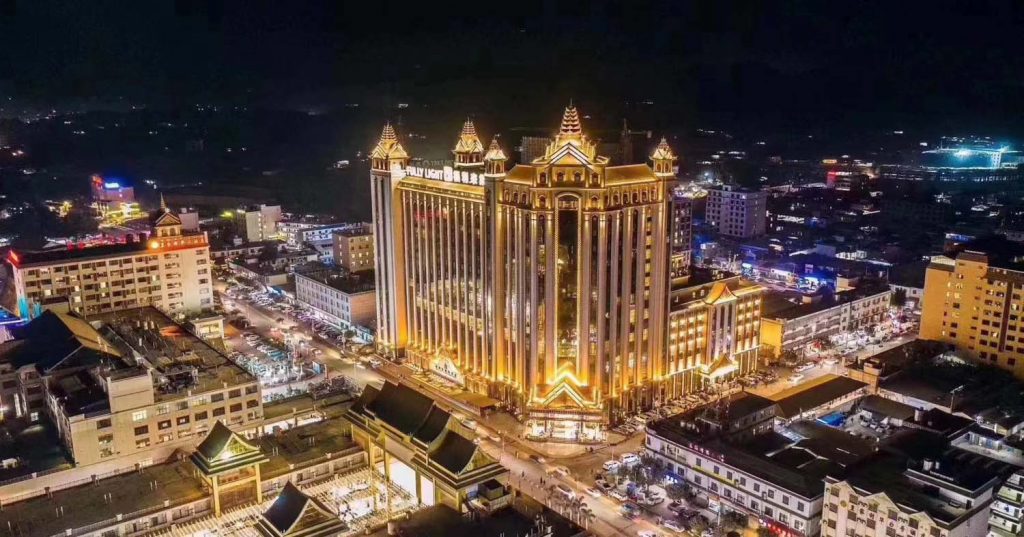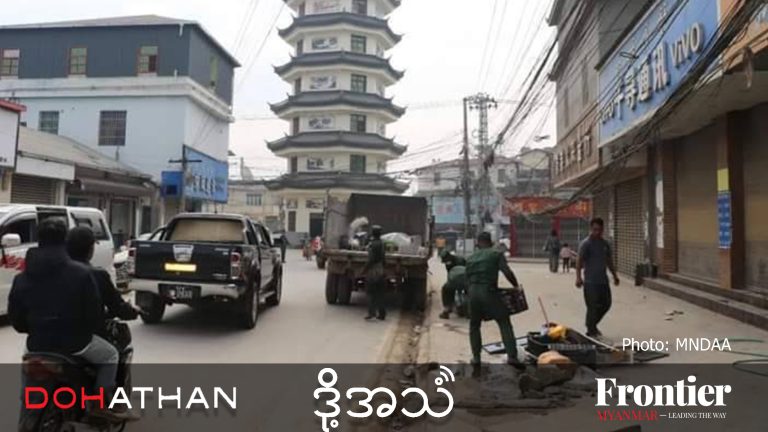Local politicians in a border region known for its frequent outbreaks of violence hope to transform it into the “next Macau”, but will have to overcome instability, politics and corruption to achieve their vision.
By NANDA | FRONTIER
A group of heavily armed gunmen sneak into town and storm three casinos. A pitched battle ensues; one person is killed and almost 300 staff are taken hostage. When the shooting ends, about 20 burned-out cars lie on the road in front of the hotels. The gunmen make off with a huge sum – said to be many tens of millions of dollars.
It might sound like a scene from a Hollywood movie, but it’s not: the robbery took place just three years ago in Laukkai, the capital of the Kokang Self-Administered Zone in eastern Shan State.
On March 6, 2017, members of the Myanmar National Democratic Alliance Army, a rebel armed group, raided the Fully Light, Kyinfu and Kyin Kyan hotel casinos, all of which are linked to a rival armed group, the Kokang Border Guard Force, which is part of the Tatmadaw.
In a country where most people have little direct experience of armed conflict, the attack further cemented Laukkai’s reputation as a violent and crime-ridden frontier town.
But Laukkai’s leaders are determined to confine violent rebellion to history. They have a new vision: to make their region safe and prosperous, and turn Laukkai into a gaming mecca on par with Macau.
During a rare visit to the city in March, Frontier met representatives of the Kokang Self-Administered Zone government, the Kokang Border Guard Force, Kokang Militia Force, government officials, police, local politicians and migrant workers to learn about the proposal and how the Kokang region is changing on the back of gambling-related tourism from China.
Many of them declined to comment on the record due to concern about upsetting the Tatmadaw, which remains the most important political actor in the Kokang region.
Crucial to their vision for the future is being allowed to operate an airstrip at Laukkai, to run licensed casinos under the Gambling Law, and to welcome foreign visitors.
If the government approves these requests, local Amyotha Hluttaw lawmaker U Kyaw Ni Naing (Union Solidarity and Development Party, Shan-11) says it will unleash a wave of investment that will transform Laukkai.
“It will turn Laukkai into one of the top ten wealthiest towns in Myanmar,” he says. “It will create job opportunities and tax revenues. The government might not need to give any budget for Laukkai anymore – it will be able to use the money raised locally.”
Far from the rulers
The Kokang region is a thin sliver of high mountains and steep valleys wedged between the Thanlwin (Salween) River to the west and the Chinese border to the north and east.
In the 18th century, the Yang clan, loyalists of the former Ming dynasty, consolidated control over the Kokang region.
Remote and almost entirely inaccessible, Kokang – and, to the south, the Wa region – served as buffer between the Shan states and Yunnan province. For most of their history they have been virtually autonomous, paying only nominal tribute to leaders to the west or east.
After the British conquest of Burma, Kokang was briefly acknowledged as part of China, but in 1897 it was ceded to British Burma and became part of the Shan states.
The British paid little attention to one of its most far-flung outposts, and after independence in 1948 the Kokang region continued to enjoy a large degree of autonomy.
But the incursion of retreating Kuomintang forces from China into Shan State thrust it onto the global stage in the 1950s.
In the following decades, Laukkai was a stronghold of the Communist Party of Burma. But in early 1989, the ethnic guerrillas of the CPB began rebelling against their mostly Bamar commanders. The mutiny erupted first in the Kokang region, in March 1989, and quickly spread to the Wa and Mong La regions.
Read more: How a Kokang becomes a citizen
Almost immediately the notorious drug lord Lo Hsing Han, an ethnic Kokang who would go on to establish the Asia World conglomerate, helped to broker a ceasefire between Lieutenant General Khin Nyunt, the head of Military Intelligence, and a local Kokang commander, Peng Jiasheng (known in Burmese as Phone Kyar Shin).
Under the terms of the deal, Peng’s ex-CPB faction – now renamed the Myanmar National Democratic Alliance Army – was granted control over the area, designated as Shan State Special Region 1. The military regime allowed the group and its leaders to keep their weapons and pursue a wide range of business interests – including opium cultivation, and heroin production and trafficking.
This agreement held for two decades, despite internal struggles between Peng and the Yang clan and the purge of Military Intelligence in 2004. However, after Khin Nyunt’s removal, relations between the military regime and Peng grew increasingly icy.
In 2008, the military regime promulgated a new constitution via a sham referendum that required all existing non-state armed groups to become Border Guard Forces under the Tatmadaw. After Peng resisted pressure to transform the MNDAA into a BGF, then-Senior General Than Shwe sent in the Tatmadaw in August 2009.
Current Senior General Min Aung Hlaing led the offensive against the Kokang group, which sent more than 30,000 people fleeing over the border into China. Taking advantage of a split in the MNDAA, the Tatmadaw quickly routed Peng’s troops; a breakaway faction became a BGF and was installed to rule over the Kokang region, which was granted “self-administered zone” status under the constitution.

It wasn’t the last of Peng or the MNDAA, however. In February 2015, during the Chinese New Year holiday, the group – allied with the Ta’ang National Liberation Army and Arakan Army – launched a surprise attack against the Tatmadaw and the Kokang BGF in an apparent attempt to regain control of the Kokang region.
The Tatmadaw responded with a heavy counteroffensive and declared martial law in the Kokang region. After nearly 100 skirmishes, and countless loss of life, the Tatmadaw managed to reverse most of the MNDAA gains, but it was unable to eliminate the group.
The offensive upended negotiations between U Thein Sein’s government and ethnic armed groups towards a nationwide ceasefire. The Tatmadaw subsequently demanded that the three groups – the MNDAA, the TNLA and the AA – surrender as a precondition for joining the peace process. This demand was rejected, and armed groups along the Myanmar-China border refused to sign the NCA later that year out of solidarity with the three groups.
Since then, the MNDAA has remained a constant threat to stability, frequently attacking the casinos and homes of senior Kokang officials, particularly those linked to the faction that ousted Peng in 2009.
But the MNDAA is a threat elsewhere in northern Shan State, too. In November 2016 the group, together with the AA and TNLA, launched major attacks on the Mandalay-Muse Highway and the border towns of Muse and Mong Ko. In August 2019, the three groups, dubbing themselves the Three Brothers Alliance, again attacked the highway, as well as a Tatmadaw institute in the Mandalay Region town of Pyin Oo Lwin, on the Shan plateau.
Read more: Terror and tears in northern Shan State
Bilateral ceasefire negotiations launched in December 2018 between the government and the three groups, along with the Kachin Independence Organisation, have stalled, in large part due to Tatmadaw demands that the groups give up territory.
As a result of the threat posed by the MNDAA, the Tatmadaw’s Regional Operations Command is the most powerful institution in Laukkai. The Kokang BGF, meanwhile, is less influential than BGFs in other parts of the country, and a separate Kokang Militia Force, with around 500 troops under its command, is also under Tatmadaw control.
However, administrative responsibilities – including the informal licensing of casinos – are at least nominally under the control of the Kokang Self-Administered Zone, know as the Leading Body.
The military-aligned Union Solidarity and Development Party controls the Leading Body, after winning all seats in the Kokang Self-Administered Zone in the 2010 and 2015 elections.
The body comprises at least 10 members, including the four Shan State Hluttaw representatives from the Kokang Self-Administered Zone.
Although the USDP is seen as close to the Tatmadaw, its lawmakers in the Kokang region have different policies from the military, and it is these politicians who are pushing for policy changes to enable the Kokang region to become the “next Macau”.
Their position reflects local antipathy towards the Tatmadaw and deep frustration at its inability to peacefully resolve the conflict with the MNDAA, which still has legitimacy in the area.
“Kokang local residents long for the return of the MNDAA, led by Peng Jiashin, rather than being under the control of the Tatmadaw,” said one source. “Members of the Kokang Leading Body want to see peace between the Tatmadaw and the MNDAA to guarantee security and improve the economy … they are scared of both the Tatmadaw, on whom they have to rely for security, and the MNDAA.”

The business of Kokang
The Kokang region remains synonymous with drugs. For decades, narcotics were the engine of the local economy and provided the capital for ostensibly legitimate business empires in Yangon, Mandalay and other parts of the country. Opium production in 2002 stood at around 175 tonnes, yielding tens of millions of dollars for small growers and billions of dollars once it hit the streets of foreign markets.
But in the early 2000s, the region’s dependence on drugs – or at least opium – began to change. The MNDAA introduced a policy of becoming opium-free by 2003, and to encourage this transition – and replace the lost income – the military government allowed the group to licence casinos in Laukkai.
A United Nations Office on Drugs and Crime report following a visit to Laukkai in March 2003 observed that Peng’s Kokang administration had “allowed numerous gambling casinos and small games of chance operators to open, catering to Chinese from across the nearby border checkpoints with China”.
The shift to an economy focused around satisfying gamblers from China has transformed Laukkai into a permanent boomtown. When journalist Bertil Lintner visited in late 1986 he found a town that was “little more than a collection of ramshackle structures made from wood and bamboo”. By 2003, karaoke bars, massage parlours and “other night life businesses” had already come to dominate the downtown area, according to the UNODC.
Today Laukkai boasts around 30 casinos and 50 hotels, including some that are 20 storeys or more – comparable to the taller buildings in Yangon. Mercedes, Land Cruisers and other expensive vehicles – all without official registration – fill the streets.
A visitor to Laukkai’s central Tong Chaing ward would be hard-pressed to know they are in Myanmar. Mandarin is the lingua franca and the official currency is yuan. The buildings are built in a style similar to towns just across the border. There are just a few signs that this is Myanmar sovereign territory: government offices, the occasional person wearing a longyi, a signboard in Burmese (although often with at least one spelling error).
Invest in Frontier Myanmar’s independent journalism by becoming a member. Sign up here.
The casinos operate inside large hotel compounds that cover many acres, and also feature shops, gardens and recreational spaces. The decor is both elaborate and kitsch, and the casinos have incongruous names ranging from Henry to Kint Kyan. Their customers are both rich and poor, placing bets of anything between 10 and 100,000 yuan (US$1.43 to $14,300).
Staff at the hotels said they are licensed by the General Administration Department rather than the Ministry of Hotels and Tourism, unlike hotels elsewhere in Myanmar.
The casinos also seem to operate in a legal grey area. Most of them predate Myanmar’s Gambling Law, which was enacted last year and enables the Union government to issue licences to casinos. Those in Kokang are licensed only by the Kokang Self-Administered Zone “Leading Body” and refer to themselves as “companies” rather than casinos.
The casinos operate 24 hours a day all year round. Although a 9pm to 5am curfew has been in place since the 2015 attack, those in the vicinity of a hotel after curfew are unlikely to be arrested.
During a tour of the smoke-filled gaming floors, Frontier observed Chinese gamblers with piles of tokens and thick wads of red 100-yuan banknotes, the largest note in circulation.
The number of gamblers was lower than normal, staff said, because of travel restrictions in China related to COVID-19.
But most expect it to be only a temporary blip. More hotels are under construction and some of the older ones are being renovated. The town is caked in a perennial layer of dust from all the construction work, which showed no signs of slowing.
Further evidence of the boom is available in nearby Siaw village, which is famous as the birthplace of Peng Jiasheng. Many restaurants have opened in the village, or are under construction.

Flying dream
But Kokang administrators have bigger dreams for Laukkai. In a strange twist, they have been partly inspired by a humanitarian project in remote mountains on the far opposite side of Myanmar
In the village of Lailenpi in in Chin State’s Matupi Township, a local and international NGO are developing an airstrip at a cost of $1.3 million with permission from Nay Pyi Taw.
Taking Lailenpi as an example, the Kokang Self-Administered Zone Leading Body applied to the Department of Civil Aviation in 2019 for permission to build a small airstrip capable of handling aircraft carrying up to 10 passengers.
They have proposed building the airstrip at the town of Shwe Htan, about 10 kilometres west of Laukkai, to encourage development in other parts of the Kokang region.
Kokang administrators have a very different purpose for their airstrip, of course; they want to bring gamblers from around the world to Laukkai, and transform it into the “next Macau”.
As well as permission to build the airstrip, they want the government to allow casinos to be licensed under the new Gambling Law so they can invite foreign investors to set up even grander casinos in Laukkai.
Read more: Investors in Myawaddy’s casinos are a law unto themselves
Local leaders also want the government to relax entry and travel restrictions for foreigners to encourage more visitors to come to Laukkai.
The Tatmadaw-controlled Ministry of Home Affairs currently restricts access to Laukkai, which means that for the time being the town’s casinos have to rely – officially at least – on gamblers from the neighbouring towns in China.
Although the Kokang Self-Administered Zone has two official border crossings on its 50-kilometre shared border with China – at Laukkai-Nansan and Chin Shwe Haw-Mengding –only Chinese who live close to the border are allowed to enter, on seven-day permits.
In practice, visitors from elsewhere in China cross the border at unofficial crossings that are common along many of Myanmar’s borders. They then exit through those gates, along with anyone who entered on a seven-day permit but overstayed, according to staff at the casinos.
“It is not difficult to enter Laukkai this way,” said a 30-year-old man who works as a driver at a Laukkai casino. “I used to help welcome people who came through these illegal channels.”
The crossings operate in the open. About two kilometres from a BGF security post near border post 125, Frontier was able to cross into China at an illegal checkpoint that was also guarded by members of the Kokang militia.
Kokang leaders say that if small planes are able to land at Shwe Htan and foreign visitors can enter more easily, the region might be able to attract 5,000 guests a day, or 1.8 million visitors a year.
Kokang leaders say this will create many job opportunities for locals in an area that still has significant levels of poverty.

Chasing the dragon
Chinese gamblers are not the only ones who come to Laukkai to seek their fortune – or, at least, a better life.
Laukkai is 188 kilometres from Lashio, the largest town in northern Shan, and small vans bring a steady stream of migrant workers from other parts of Myanmar, particularly Yangon, Mandalay and central Myanmar.
Most live in an area known as “Bamar town” on Baopong Street, in front of the Myanmar-Kokang Peace Monument. Here you can hear Burmese spoken, buy traditional Myanmar goods and change kyat into yuan.
They are very much a minority, though; out of the town’s population of 75,000, fewer than 10,000 are Bamar.
Most work in the casinos, while some toil in the sugarcane fields that dominate the surrounding region. There are also a few Bamar civil servants.
“Here, those who don’t speak Chinese do farming,” said Laukkai resident U Liu Kwal Jing. “Those who speak Chinese work on the card tables and those who speak Chinese very well work as language teachers.”
Ma May Thu Hlaing, 25, came to Laukkai in 2017 from Yangon to work in a casino. She earns about $700 a month, including bonuses, but is studying Chinese so she can get a promotion and a higher salary. “If you don’t know any Chinese, you will not get very far here,” she said.
Some of the migrants who come for work find themselves unable to resist the many temptations that Laukkai offers. Gambling, drugs and prostitution are always within easy reach. Away from the palatial gaming floors, the walls of the toilet stalls are covered with the phone numbers of prostitutes.
And although Myanmar nationals are prohibited from playing at casinos under the Gambling Law, and face a potential one-year prison sentence if convicted, it is common to see locals gambling.
“I want people to behave when they are here,” said Ko Aung Lin from Mandalay, who works at a car repair shop in Laukkai. “This town is a gold mine for us, but you need to be able to say no to drugs and gambling.”

Dreams and reality
The Kokang leaders’ dream of a gambling mecca face some challenges.
The first is building peace. Although the Tatmadaw regained control of Laukkai in the wake of the February 2015 offensive, the nighttime curfew remains in place because of the threat of further MNDAA attacks. The Tatmadaw has a large presence for security reasons, but rarely gets involved in administering the town.
MNDAA forces are still active in Konkyan Township, which is to the north of Laukkai and also part of the Kokang Self-Administered Zone.
“I’ve always encouraged the MNDAA to hold talks with the government and Tatmadaw,” said Amyotha Hluttaw lawmaker Kyaw Ni Naing. “If they can find a peaceful solution, it will be good for the whole region.”
The second challenge is a lack of skilled workers, particularly for the casinos.
Although there’s no shortage of willing workers, few can give the level of service that higher-end visitors expect, said one veteran casino employee in Laukkai who formerly worked in Macau. This is partly because staff turnover is high. “Many of the workers come here so they can earn money to send back to their families. Once they make enough money then they leave, and new, inexperienced workers arrive,” he said.
When Frontier approached government officials about the Laukkai BGF’s plans, it received a lukewarm response.
“If the Union government agrees to the plan then the Department of Civil Aviation will provide technical assistance,” said Deputy Minister for Transport and Communication U Kyaw Myo.
One senior immigration official based in Kokang, who asked not to be named, said the government was unlikely to allow visitors to enter the region with visas due to insecurity.
He said that in 2017, the MNDAA shot and killed two immigration officers at the Yanlong Kyaing gate between Laukkai and Nansan.
At least some in the government may also be put off by concerns that more casinos, even if regulated, could lead to an increase in criminal activity, particularly money laundering.
Invest in Frontier Myanmar’s independent journalism by becoming a member. Sign up here.
The number of casinos in Southeast Asia has exploded since Macau began cracking down on corruption and money laundering in 2014, as operators began seeking out new jurisdictions with little or no oversight.
The United Nations Office on Drugs and Crime has warned of a “displacement” of organised crime to Southeast Asia, as criminal networks use these new casinos to launder cash from illicit sources.
As of January 2019, UNODC estimated there were 230 casinos in the region – not counting those that are unlicensed, such as the casinos in Kokang – with many more under construction.
“The region’s rapidly expanding network of casinos, many of which are lightly or not at all regulated, has emerged as a perfect partner or offshoot industry for organized crime groups that need to launder large volumes of illicit money,” UNODC said in a 2019 report.
Over the same period, profits from Myanmar’s drug trade have increased significantly. The same UNODC report estimated the regional market for illicit methamphetamine – in both tablet and crystalline form – to be as much as $61.4 billion a year. A large proportion is manufactured within Myanmar.
Myanmar’s failure to properly regulate casinos was also a factor in the Paris-based Financial Action Task Force placing it back on a “grey list” in February due to “strategic deficiencies” in its efforts to counter money laundering and terrorism financing.
A September 2018 evaluation of Myanmar found casinos were a “significant” money laundering risk, and said it was particularly concerning that there were “no measures imposed to prevent criminals and their associates from controlling casino operations”.
Although Myanmar has since passed a Gambling Law, it is yet to issue enabling regulations and most casinos remain unlicensed.
But members of the Kokang Leading Body say that some are likely to oppose its proposal precisely because they want to keep the status quo of dozens of unlicensed casinos.
“Organisations that are enjoying dividends from the illegal casinos will not want the casinos to be legalized, because the revenue from the casinos will go to the government instead,” said one official, who spoke on condition of anonymity and refused to say which “organisations” he was referring to.
Regardless, U Maung Maung Soe, an analyst of conflict in Myanmar, said the government would not agree to the Kokang proposal while the region was still unstable.
He said The Chinese government, too, would not like to see a new casino city right along its border.
“Kokang,” Maung Maung Soe said, “is daydreaming.”
This article was supported by The Asia Foundation and UK aid from the UK government via the X-Border Local Research Network. Travel costs were supported by Internews. All views are those of Frontier.







